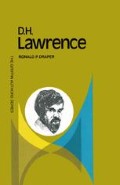Abstract
WE MUST remember,” wrote T. S. Eliot in 1935, “that what a writer does to people is not necessarily what he intends to do. It may be only what people are capable of having done to them. People exercise an unconscious selection in being influenced. A writer like D. H. Lawrence may be in his effect either beneficial or pernicious.”1 Open-ended as this statement appears to be, Eliot in fact regarded Lawrence’s influence as pernicious rather than beneficial, and his reference to a writer’s influence being limited to “what people are capable of having done to them” unwittingly explains the ground of his dislike. He and Lawrence were too different for either to be in sympathy with the other, at least during the 1920’s, and, one imagines, if Lawrence had been alive, during the 1930’s as well.
Preview
Unable to display preview. Download preview PDF.
Author information
Authors and Affiliations
Copyright information
© 1964 Macmillan Publishers Limited
About this chapter
Cite this chapter
Draper, R.P. (1964). Reputation and Influence. In: D. H. Lawrence. Author Chronologies Series. Palgrave, London. https://doi.org/10.1007/978-1-349-02949-5_9
Download citation
DOI: https://doi.org/10.1007/978-1-349-02949-5_9
Publisher Name: Palgrave, London
Print ISBN: 978-0-333-19650-2
Online ISBN: 978-1-349-02949-5
eBook Packages: Palgrave Literature & Performing Arts CollectionLiterature, Cultural and Media Studies (R0)

